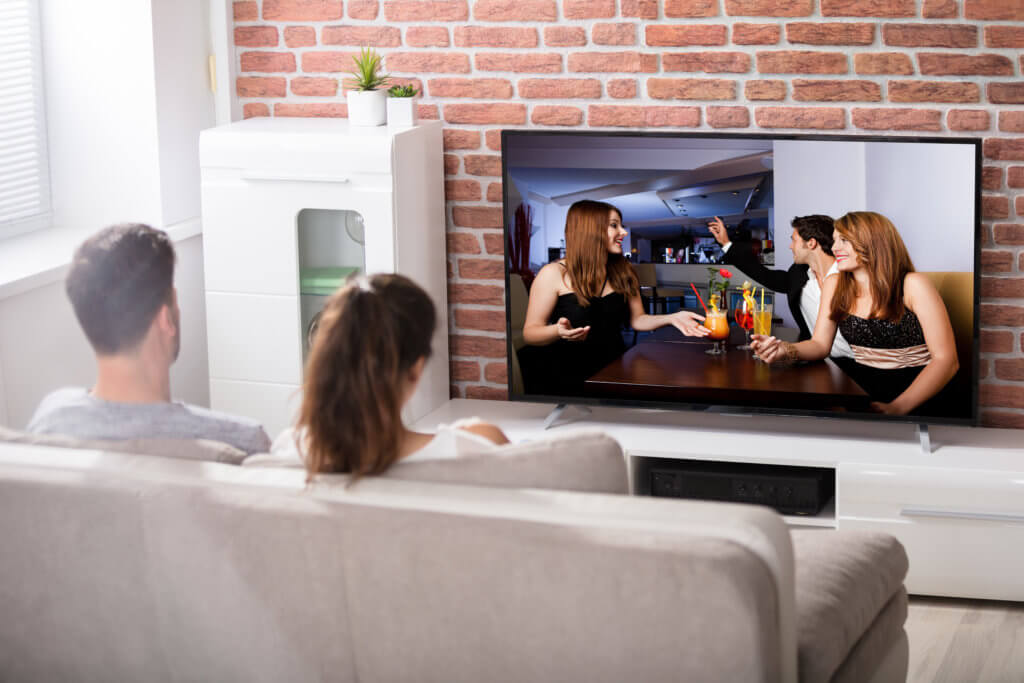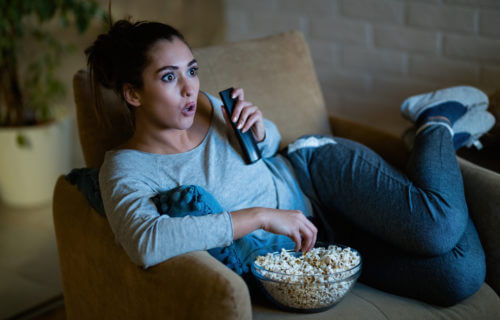SAN DIEGO — Binge-watching is a uniquely modern phenomenon brought on by the age of streaming. Why get up off the couch at all when an entire season of your favorite TV show is ready to roll at the press of a button? It may seem hedonistic at first, but fascinating new findings indicate a whole lot of self-control is actually involved in streaming binges.
Researchers from the University of California-San Diego’s Rady School of Management and School of Global Policy and Strategy have found that people tend to preemptively schedule their binge watching, preferring to consecutively watch certain shows or movies over others, and will often pay with money or time to binge shows. So, the next time you’re feeling guilty about binge-watching your favorite show, keep these findings in mind. While the term “binge” implies impulsive behavior, binge-watching TV is a common activity, planned out in advance by viewers.
People prefer marathons over single episodes
In collaboration with the Tepper School of Business at Carnegie Mellon University and Fox School of Business at Temple University, this study has revealed that viewers prefer to binge-watch certain types of programming over others. People are also more likely to pay to watch a show consecutively or wait to be able to consume more than one episode at a time.
“We find that the notion of a show being so interesting that it just sucks people in and they can’t pull away is not the whole story,” says study coauthor Uma Karmarkar, assistant professor of marketing and innovation at UC San Diego’s Rady School of Management and School of Global Policy and Strategy, in a university release. “Binge-watching can have a negative connotation, like binge eating or binge drinking. It is generally seen as impulsive, maybe problematic, but certainly very indulgent. However, media consumption is more complex. Binge-watching is not always about a failure of self-control; it can also be a thoughtful preference and planned behavior.”
Researchers explain that people tend to plan to binge shows they perceive to be more sequential and connected, in other words, having an overarching narrative. Examples include popular programs such as “Stranger Things,” “Peaky Blinders,” and “Bridgerton.” Those shows are watched consecutively, while other programs like “Law and Order: SVU,” or reality competition shows like “Chopped,” feature more encapsulated, singular episodes.
Importantly, the study also notes that regardless of a particular show’s bingeable qualities, people are far less likely to plan on watching multiple episodes if the streaming service or channel has commercials.

Moreover, genre alone does not appear to be an accurate predictor of a desire to binge. Documentary series — if they have a consecutive story line — can be just as bingeable as fictional series, illustrating a consistent model extending into the field of “edutainment” programming, study authors explain.
This study also shows that how TV programs and movies are described and marketed to consumers have a big impact on what people plan to binge and not binge.
“We find increased plans to binge can be triggered by merely framing content as more sequential vs. independent, which suggest that media companies can strategically emphasize content structure to influence consumer decisions and media viewing styles,” notes study first author, Joy Lu, assistant professor of marketing at Carnegie Mellon’s Tepper School of Business.
This work can be valuable to entertainment companies, as it could prove instrumental in helping with market research, Karmarkar adds.
“Viewing platforms could launch consumer surveys to get a sense for how likely a viewer would be to plan their schedule around binging a certain show,” she says. “This is important because streaming media companies don’t necessarily only want you to binge-watch on their platform. If you log back in at different times, you might see different ads, you may build loyalty to brand, and perhaps you keep your subscription longer. It could be beneficial for companies to want some of their content to be more bingeable and other content to be more spread out.”

This project was massive, encompassing multiple studies involving hundreds of participants, replicating results and revealing new findings along the way. The first included experiment showed that people can and do plan out their binging habits. People were surveyed online and asked to think about how they would plan to watch a show they wanted to stream. Each person was asked to create a calendar for the following six days, allowing authors to see whether they would stack episodes together or spread them out. Most participants created “clumpy” viewing plans, which involved binging multiple episodes in one sitting. However, participants didn’t stack all the episodes on one day, offering a different view of binging than the one predicted by a lack of self-control.
A different study provided people with a list of the top 100 television streaming series. Half were then asked to classify the shows as more or less “bingeable” and the other half to classify the shows as independent vs. sequential. Upon combining that data, it was revealed that shows rated as highly bingeable were also rated as more sequential.
Differences in plans to binge independent and sequential media were also replicated in how people approach streaming media in regard to online education courses. An entirely separate experiment revealed that people are more likely to plan to binge a Coursera class if it is believed to be more sequential. Then, study authors analyzed real-world data from the Coursera platform, finding that these plans to binge-learn accurately predicted viewing behavior among enrolled students.
This work also resolves an apparent conflict with earlier research that had found people often prefer to savor good experiences by delaying them and deriving additional pleasure from anticipation or spreading them out over an extended period. Study authors note that prior studies focusing on this issue mostly involved independent experiences, such as going out to eat or going on vacations, which, according to their theory would be “less bingeable.”
The study is published in the Journal of Experimental Psychology Applied.

